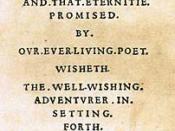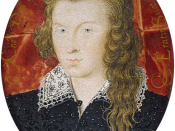Survey of English Literature
Kachramani Filia
Professor: Dr. Zengos
Exam 2
Shakespeare's Sonnets 12 & 73
Time that unavoidably leads to death and decay is the main theme of Shakespeare's sonnets 12 and 73, but it is being treated differently. In the sonnet 12, the speaker addresses a young man and advises him to procreate, since as the time passes by, eventually everything dies. It is a universal theme of philosophical nature, which in the end conveys a hopeful message, as it offers a way to "defeat" death. While in the sonnet 73, the speaker is mostly preoccupied with the fact that as time progresses, he's getting older and soon he will die. He is desperate and he asks from the listener to love him and be with him, now that his end is near. Finally, the different dealing with the theme is illustrated through the imagery of nature and the course of time.
In both of the sonnets, is depicted the ravages of the time on the human nature, through the succession of the seasons, that symbolize our mortality, since in the nature's circle of life and death men cannot participate. In the sonnet 12, the speaker states that he is no longer a young man, and uses images of nature to show the transitory of human nature. The violet, that symbolizes spring, has "past prime" (l.3), winter has come and so his black hair of youth has now turned silvery. Summer's wheat that is "girded up in sheaves" (l. 7), the harvest time is over, it is winter now and he has a "white and bristly beard" (l. 8). Finally, as autumn leaves forever and winter takes its place, he is nothing more than "a lofty tree of barren leaves"(l. 5), vulnerable to the destructive process...


